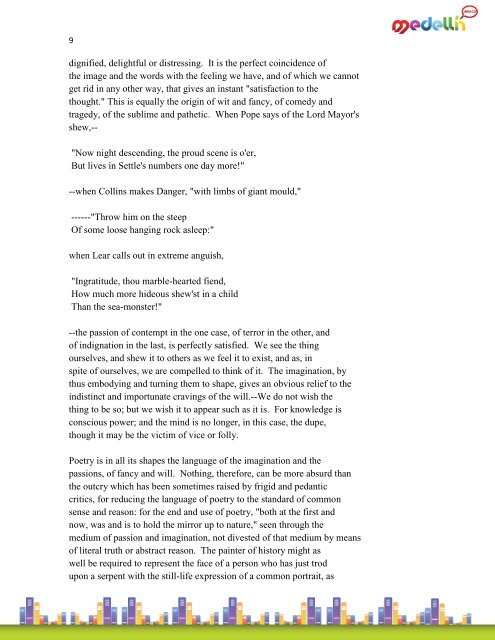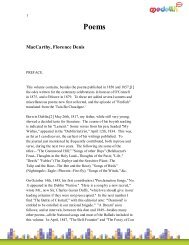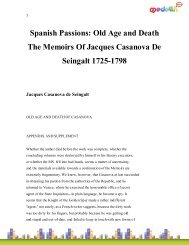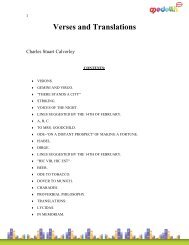Lectures On The English Poets William Hazlitt
Lectures On The English Poets William Hazlitt
Lectures On The English Poets William Hazlitt
You also want an ePaper? Increase the reach of your titles
YUMPU automatically turns print PDFs into web optimized ePapers that Google loves.
9<br />
dignified, delightful or distressing. It is the perfect coincidence of<br />
the image and the words with the feeling we have, and of which we cannot<br />
get rid in any other way, that gives an instant "satisfaction to the<br />
thought." This is equally the origin of wit and fancy, of comedy and<br />
tragedy, of the sublime and pathetic. When Pope says of the Lord Mayor's<br />
shew,--<br />
"Now night descending, the proud scene is o'er,<br />
But lives in Settle's numbers one day more!"<br />
--when Collins makes Danger, "with limbs of giant mould,"<br />
------"Throw him on the steep<br />
Of some loose hanging rock asleep:"<br />
when Lear calls out in extreme anguish,<br />
"Ingratitude, thou marble-hearted fiend,<br />
How much more hideous shew'st in a child<br />
Than the sea-monster!"<br />
--the passion of contempt in the one case, of terror in the other, and<br />
of indignation in the last, is perfectly satisfied. We see the thing<br />
ourselves, and shew it to others as we feel it to exist, and as, in<br />
spite of ourselves, we are compelled to think of it. <strong>The</strong> imagination, by<br />
thus embodying and turning them to shape, gives an obvious relief to the<br />
indistinct and importunate cravings of the will.--We do not wish the<br />
thing to be so; but we wish it to appear such as it is. For knowledge is<br />
conscious power; and the mind is no longer, in this case, the dupe,<br />
though it may be the victim of vice or folly.<br />
Poetry is in all its shapes the language of the imagination and the<br />
passions, of fancy and will. Nothing, therefore, can be more absurd than<br />
the outcry which has been sometimes raised by frigid and pedantic<br />
critics, for reducing the language of poetry to the standard of common<br />
sense and reason: for the end and use of poetry, "both at the first and<br />
now, was and is to hold the mirror up to nature," seen through the<br />
medium of passion and imagination, not divested of that medium by means<br />
of literal truth or abstract reason. <strong>The</strong> painter of history might as<br />
well be required to represent the face of a person who has just trod<br />
upon a serpent with the still-life expression of a common portrait, as

















